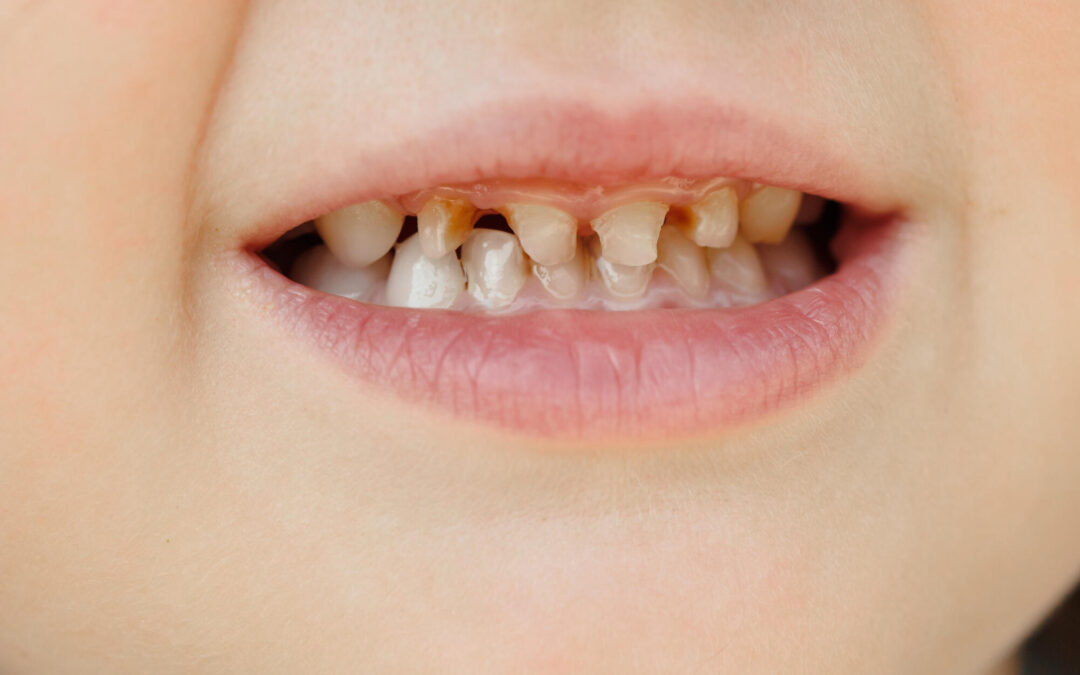According to the most recent available data from the U.S. CDC, nearly half of American children 2 to 19 years old have untreated or restored dental caries. Caries, also known as tooth decay or cavities, affect one or more of their baby (primary) or permanent teeth.
So, considering their prevalence, are cavities normal in children, then? How do they occur, and what can happen if they go untreated? What are their treatment options, and are they preventable?
All those questions are likely running in your mind if you suspect your little one has a cavity.
Our caring team at Kentuckiana Pediatric Dentistry in Mt. Washington and Shepherdsville, KY, created this guide discussing dental cavities. Read on to discover their causes, treatment, and prevention.
Are Cavities Normal in Kids?
While tooth decay or cavities are undoubtedly prevalent in children, they’re not normal. As the Office of Disease Prevention and Health Promotion (ODPHP) points out, they’re the most common chronic disease affecting children’s dental health (and also that of adults) in the United States.
Remember: Diseases are harmful deviations from a person’s normal functional and structural state.
How Do Dental Cavities Occur?
The mouth is an incredible organ, home to a thriving community of microorganisms collectively known as the “oral microbiome.” As reported by The Conversation, this community consists of viruses, yeasts, protozoa, and at least 700+ known species of bacteria.
Many bacteria in the mouth are harmless. Some are even beneficial, such as helping encourage salivation for better digestion. However, many others cause disease; they promote tooth decay by producing plaque and acids that attack the tooth’s enamel.
Such acids form when decay-causing bacteria come into contact with the starches and sugars from food and drinks. The longer this goes on, the more frequently the teeth get attacked by acids and the more minerals they lose. Over time, the enamel becomes too weak and breaks down, resulting in a cavity.
What Happens When Cavities Go Untreated?
When dental cavities go untreated, their holes can become bigger until they expose the dentin, the tooth’s second layer. The dentin has nerve endings, so tooth pain and sensitivity are more likely to occur when this layer becomes exposed.
Cavities can continue progressing until they spread to the tooth’s center, where the nerve-filled dental pulp is. At this point, the pain can become even more severe, which may prevent children from sleeping well.
From there, premature tooth loss may follow. While children will lose their baby teeth eventually, that doesn’t mean it’s okay for them to lose their primary teeth early. Early tooth loss can lead to long-term dental issues, such as bite problems and crooked teeth.
How Do Dentists Treat Dental Cavities in Kids?
If a cavity has already formed on your child’s tooth, their pediatric dentist in Mt. Washington or Shepherdsville, KY, can treat it with a dental filling. The procedure involves removing decayed tooth tissue. After that, the dentist will restore the tooth with a tooth-colored filling material.
Are Cavities in Children Preventable?
Yes! Cavity prevention is also much better than restoration, as it helps keep your little one away from discomfort and pain.
Here are some of the top methods and parenting dental tips to prevent cavities.
Practicing Optimal Oral Hygiene
As mentioned above, dental plaque and acids attack the teeth and cause tooth decay. For this reason, removing plaque (and the acid-producing bacteria in it) is vital to preventing cavities.
So, to help your little ones avoid tooth decay, teach them how to develop optimal kids’ oral care and hygiene habits. Show them how proper brushing and flossing work, and be a good role model by “practicing” what you preach. For example, you can turn brushing twice daily into a parent-child activity, which lets you spend more time with them.
Drinking and Using Fluoride
Fluoride is a naturally occurring mineral. It can help prevent tooth decay by strengthening tooth enamel and boosting its resistance to cavities. It also helps repair the damage that acids have already caused by “remineralizing” the teeth.
According to the American Dental Association (ADA), consuming fluoride through drinking fluoridated water is safe. Research has even shown that fluoridated local water systems prevent at least 25% of dental decay in people, regardless of age!
Your children’s pediatric dentist in Mt. Washington or Shepherdsville, KY, can also recommend fluoridated dental products that are safe for the entire family, such as toothpaste and mouth rinses.
Direct Fluoride Application
If your little one’s tooth decay is in its early stages and hasn’t formed a hole yet, their pediatric dentist may still be able to reverse it by directly applying fluoride. Doing so can help fortify the affected tooth before it becomes too weak and develops cavities.
Even if your child doesn’t have tooth decay, they can still benefit from a fluoride varnish treatment. In this case, the dentist will apply fluoride on all tooth surfaces (top and sides). Combining this with optimal oral hygiene habits and regular trips to the dentist can help your little one keep cavities at bay.
Regular Dental Cleanings and Check-Ups
While optimal oral care habits are vital to stopping tooth decay, some plaque can remain even after brushing and flossing. As more bits of plaque form and go unremoved, they can harden into dental calculus or “tartar.” Tartar can also cause tooth decay, and brushing alone can’t remove it.
So, please consider seeing the dentist with your little ones at least once yearly for cleanings and check-ups. Dentists have specialized tools designed to remove tartar. Plus, they can spot early signs of potential tooth decay and address it immediately before it worsens into a cavity.
Keep Cavities Away
So, are cavities normal in kids? No, they’re not, although they’re prevalent. The good news is they’re highly preventable with proper oral hygiene, fluoride, and regular dental cleanings.
If you’re ready to help your kids combat dental cavities, so is our compassionate team at Kentuckiana Pediatric Dentistry. Our caring team and highly experienced kid’s dentist, Dr. Mitchell, can provide your little ones with quality dental care to help them now and in the future. We have two offices: one in Mt. Washington and another in Shepherdsville, KY.
Speak with us today to learn more about our cavity-fighting treatments!


Recent Comments